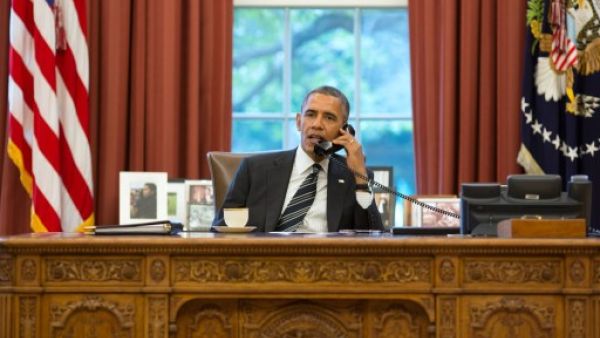It’s autumn in the Northern Hemisphere. But if one were to look at the thaw in the relations between the West and Iran in recent months, one could be forgiven for thinking that it’s spring. Like the season of renewal, recent incidents have inspired hope for warmer times between the two countries ahead.
Iran’s President Hassan Rouhani tweeted Happy Rosh Hashanah. US President Barack Obama made a historic phone call to Rouhani, the first between rulers of Iran and the United States since 1979. Rouhani cancelled an upcoming anti-Israeli conference initiated by his predecessor. On Tuesday, Iranian leaders will meet with six of the world’s major powers in Geneva to discuss Iran’s nuclear program and the potential lifting of the sanctions imposed on the Islamic Republic by the West.
Regardless of these new developments, some journalists have been reluctant to abandon their habit of maintaining an attitude of gloom and doom when it comes to the relationship between Washington and Tehran. Some recent articles have focused on a hardliner throwing a shoe at Rouhani as he returned from New York, while others have made reference to the disapproval of Iran's supreme leader, Ayatollah Ali Khameini, of the Obama-Rouhani phone call.
However, these commentators have missed the point. Yes, a hardliner threw a shoe at the Iranian President. However, to keep things in perspective, it was only one hardliner throwing one shoe – alongside the shoe-thrower, there were hundreds of Rouhani supporters, warmly cheerring the President's arrival as he returned diplomatically triumphant to Tehran.
As for Khamenei’s disapproval, his comments have to be viewed in context. The supreme leader made his comments days after Israel’s persistent Prime Minister Benjamin Netanyahu had gained Obama's assurances that America would keep “all military options on the table” when it came to Iran. Looking at Khameini's comments through this context, the religious leader's statement can be taken as reactionary political posturing.
Let’s not forget that Khamenei, when speaking at a gathering of members of the Islamic Revolutionary Guard Corps on the subject of renewed diplomacy with the West last month, said: "Your servant believes in what was coined years ago: 'heroic flexibility.' Flexibility is necessary on certain occasions. It is very beneficial."
There is no denying that Iranian hardliners pose obstacles to a peace deal signed between Tehran and Washington – like any political leader, Rouhani must walk a sensitive tightrope to appease the staunchly conservative factions in Iran. In a bid to placate the hardliners at home, Rouhani even declined the opportunity to shake hands with Obama at the recent UN General Assembly (much to the glee of Netanyhau).
However, Khamenei is largely in control of his followers and has shown signs of willing to be flexible. There’s one party crucial to the peace process that has so far proved themselves to be entirely opposed to walking on the path of “heroic flexibility” – members of the Tea Party in the US House of Representatives.
A relatively small group, the Tea Party's power is not to be underestimated – so great is their influence that they were recently able to shut down the US government by refusing to pass a provisional budget. These conservatives exert sufficient influence in Congress to override the more moderate opinions of Democrats and fellow Republicans. They are largely elected from very safe Congressional districts, where a large percentage of the voters support their views – in other words, they are not going to be leaving office or ceding their political sphere of influence anytime soon.
And what does this group have to say about the US-Iran peace process? Tea Party member Marco Rubio recently said, “We are dealing with a (Iranian) government run by dangerous, evil liars.” Aside from their distrust of Tehran, they want Iran to cease all nuclear enrichment, be it for peaceful or for military purposes – a definite no-go for Iran, who recently spoke out on their absolute right to enrich uranium on their soil.
Whereas it is a small group of Iranian hardliners who are impeding diplomatic progress with the US, the conservatives within the House of Representatives have considerable political sway and have shown themselves to be entirely opposed to the rejuvenation of any kind of relationship between Washington and Tehran. The American sanctions on Iran cannot be eased without approval from the Congress. With recent political issues such as the economy and Syria demonstrating that the Tea Party will block every move it does not want to undertake, it seems the next government initiative it will stagnate will be the revival of US-Iranian relations.
In 1979, Iranian hardliners came to power and cut off all bygone relations between their country and America. Thirty four years later, the hardliners will still have their say. However, it appears this time around, they will be from America, and not Iran.







